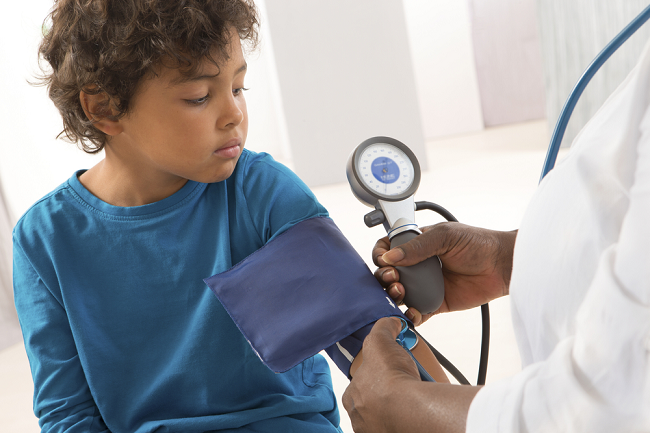Q: Our pediatrician took my son’s blood pressure during our last office visit. Why is it necessary to measure the blood pressure of a four-year-old?
A: All children over age 3 should have their blood pressure measured routinely with a blood pressure cuff that is an appropriate size for the child’s upper arm. Regular monitoring of your child’s weight, height, and body mass index, as well as blood pressure, is important. With sharp increases in obesity, poor dietary choices, and physical inactivity, our kids are developing high blood pressure at record rates.
Childhood hypertension is a major risk factor for developing cardiovascular disease during adulthood. Moreover, untreated hypertension in children can harm organs like the heart, eyes, and kidneys. Obesity can also harm the kidneys directly — or more often indirectly — by increasing the risks of hypertension and other cardiovascular risk factors.
Hypertension means blood pressure is greater than defined standards. Childhood blood pressure standards are derived from large databases and can vary with the child’s age, sex, and height. A diagnosis of hypertension requires repeated elevated blood pressure readings, obtained at different times.
Primary hypertension is more common in teens and adults. Lately, hypertension has been seen more commonly in younger children, especially those who are obese. Many children and adolescents with high blood pressure have family members with hypertension.
Most cases of hypertension in infants and younger children are caused by other diseases such as kidney disease. This is known as “secondary” hypertension.
While some children may need medications to control hypertension, weight reduction is the single most important treatment option for obesity-related hypertension in children and teens. Prevention of additional weight gain can avoid additional increases in blood pressure. Avoiding disproportionate weight gain during early childhood may prevent hypertension.
Along with appropriate caloric intake, diets should be low in salt, saturated and total fat, and cholesterol, and be rich in fruits, vegetables, and dairy products. Encouraging active play for younger children, or at least 60 minutes of moderate physical activity most days of the week for older children, should also help avoid excessive weight gain. Obesity is lowest among children who watch less than one hour of TV per day.
Learn more about Pediatric Nephrology and Hypertension at Children’s Hospital at Erlanger. If you are concerned about your child’s blood pressure, make an appointment with your pediatrician. If you don’t have a pediatrician, find one here.







